- Home
- Burt L. Standish
The Cruise of the Snowbird: A Story of Arctic Adventure Page 11
The Cruise of the Snowbird: A Story of Arctic Adventure Read online
Page 11
had had to face nevertheless, andthey soon learned to do so cheerily, and to feel just as happy undertheir glittering oilskins and sou'-westers, with half a gale tearingthrough the rigging, and the spray dashing most uncomfortably in theirteeth and eyes, as they did when, with all sail set, they glided calmlyover the rippling sea, the sun shining brightly overhead, and the purplemist of distance half hiding the rugged mountains. McBain knew exactlywhat the cutter could do, and to use his own phrase, he just kept her atit. In fact he got to love the boat, and he used to talk about her as aliving thing. And so she really appeared to be, for although she almostinvariably did all that was required of her, there were days when sheseemed to evince a will and determination of her own, and to want toshake herself free of all control.
"Wo, my beauty?" McBain would say when she was particularlydisobedient, talking to her as if she were a restless hunter; but hewould smile quaintly as he spoke, for the vessel's little eccentricitiesonly served to show off his seamanship. He said he knew how to manageher, and so he did. So he used to play with her, as it were, while in asea-way or on a wind, and delighted in showing off her good qualities.Not that he did a great deal of the manual labour himself. Was he notmaster, and were not Ralph, Allan, and Rory not only his crew, but hispupils as well? It would have been unfair to them, then, if they hadnot been allowed to do all they had a mind to, and that, I assure you,was nearly everything that was to be done. But McBain had all theorders to give when sailing, especially if there was a bit of a blow on.
I am rambling on with my tale now in a kind of a gossiping fashion; butit is not without a purpose. I wish you to know as clearly as possiblewhat manner of man McBain was, because you will see him in severaldifferent strange positions before he finally disappears from off theboards.
Well, then, when giving his orders, he never talked a bit louder norquicker than there was any occasion for. He knew by experience that acommand given in a sharp, loud key, was very likely to cause nervousnessand slight confusion in obeying it. Woe is me for your officers onboard big ships--and there are many of them too--who, while givingorders, strut about the decks, and stamp and yell at their men; they dobut excite them, and cause them to give proof of the proverb, "The morehurry the less speed." More than once have I seen a good ship's safetyjeopardised in a squall, and all through this fault in the officercarrying on duty. But you see McBain loved the crew--he loved "hisboys," as he was fond of calling them, and he was wishful to impart tothem in a friendly way all the knowledge of boats that he himselfpossessed.
If you had called McBain a sailor, he would have replied,--
"No, sir, I'm not a sailor; I'm only a boatman, or a fisherman if youlike it better."
But this was only McBain's modesty. A sailor by profession he certainlywas not, although he had, as I before told you, spent a portion of hisyounger life at sea; but from his infancy he was used to rough it, notonly on the stormy lakes of the inlands, but in open or half-deckedboats all along the western shores of romantic Scotland, and that, too,in winter as well as in summer; nor was there a loch, nor cape, nor kylehe did not know every bearing of, from Handa Isle in the north,southwards as far as the Ross of Mull. And that is saying a great deal,for on that wild, indented coast, exposed as it is to the whole force ofthe wide Atlantic, stormy seas are met with and sudden squalls, such asare happily but little known on the shores of Merrie England.
"He _is_ a good seaman, isn't he?" Rory had said one day to old Ap,referring, of course, to McBain.
"Is it seamanship you talk of?" old Ap replied. "Look, you see, sir;I'd rather be in a herring boat with McBain in half a gale of wind,although he was managing the sails by himself look, you see, andsteering with his teeth or knees, so to speak, than I'd be in a 200-tonschooner, with a score of dandified yachtsmen; yes, yes, indeed."
Hearing old Ap talk thus enthusiastically about quiet, non-assumingMcBain, the latter gained an ascendency in Rory's estimation that henever after lost.
Often, in fact as a rule, McBain smiled when he gave an order to hisboys, but his was not a stereotyped smile. His smile played not onlyaround his lips, but it danced around his eyes and lighted up all hisface. It was not, however, so much the smile of mirth as that ofgenuine good-heartedness.
Often, even when in a difficult position, he would allow the young mento handle the boat according to their own judgment, but at the same timehis grave grey eyes would be cautiously watching their every movement,and his hand would be ready at a moment's notice to grasp a sheet orrectify a foul, and so prevent unpleasantness. I am not sure thatMcBain's method of teaching was not somewhat unique in many ways, but itwas at times very effective.
"I'm not sorry that this should have happened, my boys," was one ofMcBain's favourite expressions, after any little accident or mishap.His crew knew well that he meant that a lesson given roughly, and sentwell home, was likely to be remembered.
One day, for example, with Rory as steersman, their course led thempretty close to the passenger boat _Crocodile_. Perhaps they needn'thave gone near enough to have most of the wind taken out of their sails,and their way considerably lessened; perhaps, though, Rory was just alittle proud of his pretty vessel, and of being looked at by the ladypassengers, looked at and probably admired; be this as it may, he forgota warning that McBain had often given him, to have an easy sheet for thesudden rush of wind that would meet them, immediately after passing toleeward of anything, and so, on this particular day, his pride had amost disagreeable fall, and he himself, with the rest of his companions,had a good wetting, for down went the _Flower of Arrandoon_ on her beamends as soon as they had cleared the _Crocodile_. But she was wellballasted, the sliding hatch was on, and when sheets were eased sherighted again, though it was a considerable time before _Rory_ rightedagain.
McBain shook himself a bit, much in the same way that a Newfoundland dogdoes.
"I'm not sorry that this should have happened," he said, quietly.
Rory was, though. Especially when Ralph laughed pointedly at, ortowards him.
Well, but another day Rory had his revenge, and the laughing was all onthe other side.
It happened thus: they were cracking on nicely with every inch of canvasspread, sailing pretty close to the wind. The light breeze was on tothe land, from which they were distant about a mile and a half, andalthough the sea was very far from being rough, there was a bit of aswell rolling in. Now Ralph was tall, and stout, and strong; he was nofeather-weight therefore, but for all that the cutter did not requirehim to sit upon her weather gunwale, in order to keep her fromcapsizing. She could have done just as well had he kept on the seat,and by so doing he would have been consulting his own safety. Many atime and oft had McBain pointed this out to him, but he seemed forgetfulon this particular point, and so, on the day in question, he was lazilyoccupying the forbidden quarter. One would have thought that the saucywee yacht had done it on purpose; be that as it may--when down in thetrough between two seas she simply gave a kind of a swing--hardly alurch--in the wrong direction for Ralph's stability, and over he went,literally speaking, heels over head, into the sea, a most ungraceful andunscientific way of taking to the water.
Both Allan and Rory knew well that their friend could swim, and thelatter at all events seemed to treat the affair as a very pretty pieceof entertainment.
"Man overboard?" he shouted. "Let go the life-buoy, Allan."
Instinctively Allan did as he was told, and sent the big cork ringflying after Ralph, but seeing the merry twinkle in Rory's eye, andknowing there was no necessity for it, he repented having done so nextminute.
"Lower away your dinghy," cried McBain to Allan, as he hauled theheadsails to windward and stopped the cutter's way, "it will be a bit ofpractice for you."
Allan was pulling away astern two minutes after in the little boat,dignified by the undignified name of dinghy, for she was very tinyindeed, but Allan could have sculled a wash-tub.
He soon met Ralph coming ploughing and spluttering along, br
easting thebillows, for he was a powerful young swimmer, with the life-buoy infront of him, which, however, he scorned to make use of.
"Take your little joke on board," he cried laughing. Allan picked upthe buoy and threw Ralph a rope.
"That's better," said Ralph, and in a few minutes more they werealongside and on board.
Rory was singing "A life on the ocean wave," and the merry twinkle hadnot left his eyes.
When Ralph had changed his dripping clothes for dry ones, and reappearedlooking somewhat blue, Rory had his laugh out, and all hands were fainto join.
"I caught a crab indeed," said poor Ralph.
"Caught a crab is it?" cried Rory. "It wasn't a crab but a turtle youturned. Och! it was the beautifulest sight ever I saw in the world tosee the long legs of you go

 Dick Merriwell Abroad; Or, The Ban of the Terrible Ten
Dick Merriwell Abroad; Or, The Ban of the Terrible Ten Wild Adventures round the Pole
Wild Adventures round the Pole Storm-Bound; or, A Vacation Among the Snow Drifts
Storm-Bound; or, A Vacation Among the Snow Drifts In the Yellow Sea
In the Yellow Sea Frank Merriwell's Triumph; Or, The Disappearance of Felicia
Frank Merriwell's Triumph; Or, The Disappearance of Felicia Treasure of Kings
Treasure of Kings Bert Wilson's Twin Cylinder Racer
Bert Wilson's Twin Cylinder Racer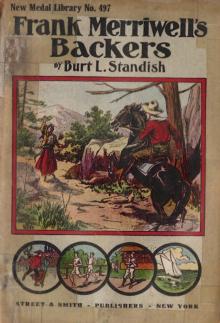 Frank Merriwell's Backers; Or, The Pride of His Friends
Frank Merriwell's Backers; Or, The Pride of His Friends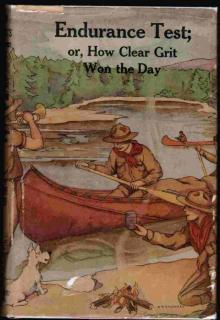 Endurance Test; or, How Clear Grit Won the Day
Endurance Test; or, How Clear Grit Won the Day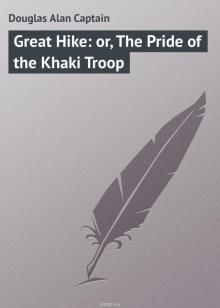 Great Hike; or, The Pride of the Khaki Troop
Great Hike; or, The Pride of the Khaki Troop The Swan and Her Crew
The Swan and Her Crew A cup of sweets, that can never cloy: or, delightful tales for good children
A cup of sweets, that can never cloy: or, delightful tales for good children Frank Merriwell's Bravery
Frank Merriwell's Bravery Frank Merriwell Down South
Frank Merriwell Down South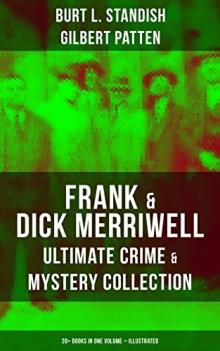 Dick Merriwell's Trap; Or, The Chap Who Bungled
Dick Merriwell's Trap; Or, The Chap Who Bungled The Trail of the Seneca
The Trail of the Seneca Wild Life in the Land of the Giants: A Tale of Two Brothers
Wild Life in the Land of the Giants: A Tale of Two Brothers From Squire to Squatter: A Tale of the Old Land and the New
From Squire to Squatter: A Tale of the Old Land and the New The Cruise of the Snowbird: A Story of Arctic Adventure
The Cruise of the Snowbird: A Story of Arctic Adventure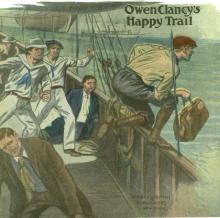 Owen Clancy's Happy Trail; Or, The Motor Wizard in California
Owen Clancy's Happy Trail; Or, The Motor Wizard in California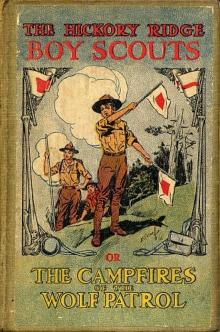 Boy Scouts: Tenderfoot Squad; or, Camping at Raccoon Lodge
Boy Scouts: Tenderfoot Squad; or, Camping at Raccoon Lodge Sing a Song of Sixpence
Sing a Song of Sixpence Frank Merriwell's New Comedian; Or, The Rise of a Star
Frank Merriwell's New Comedian; Or, The Rise of a Star The Sa'-Zada Tales
The Sa'-Zada Tales The Girl Scout's Triumph; or, Rosanna's Sacrifice
The Girl Scout's Triumph; or, Rosanna's Sacrifice Wild Adventures in Wild Places
Wild Adventures in Wild Places Fairies I Have Met
Fairies I Have Met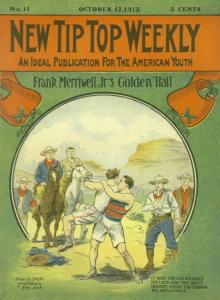 Frank Merriwell's Son; Or, A Chip Off the Old Block
Frank Merriwell's Son; Or, A Chip Off the Old Block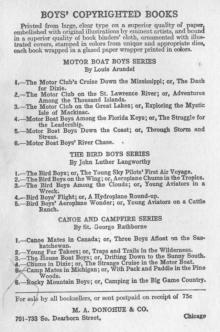 Motor Boat Boys' River Chase; or, Six Chums Afloat and Ashore
Motor Boat Boys' River Chase; or, Six Chums Afloat and Ashore Frank Merriwell's Athletes; Or, The Boys Who Won
Frank Merriwell's Athletes; Or, The Boys Who Won Bart Keene's Hunting Days; or, The Darewell Chums in a Winter Camp
Bart Keene's Hunting Days; or, The Darewell Chums in a Winter Camp Captain June
Captain June